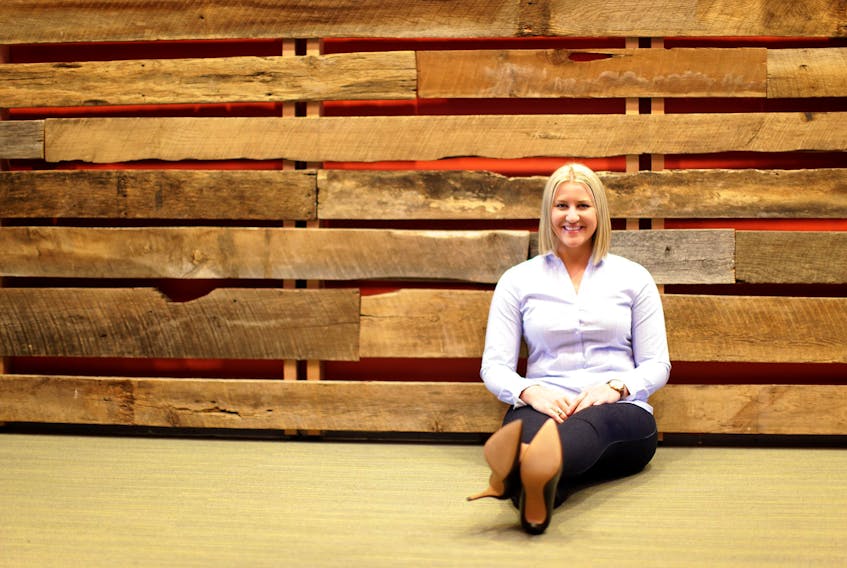In a new five-part series, the SaltWire Network delves into some of the hottest startups in Atlantic Canada. Each story focuses on three startups shaping an area of the entrepreneurial economy. Part four focuses on fintech startups.
PART 1: Three companies shaping Atlantic Canada's health and fitness startup scene
PART 2: Three companies shaping Atlantic Canada's food tech startup scene
PART 3: Three companies shaping Atlantic Canada's green tech startup scene
PART 5: Three companies shaping Atlantic Canada's medtech startup scene
Riddl
What’s the startup
Riddl has developed a cloud-based platform to track the outcome of so-called impact investments — spending by companies or non-profits intended to improve social or environmental issues. The Fredericton startup’s software crunches data and determines whether an investment has sparked change related to various causes, including health, poverty, education, climate change and gender equity. The idea is to help investors make decisions that will lead to better returns and greater social change.
The origin story
For years, entrepreneur Jenelle Sobey wondered about the best way to solve complex social problems. “It started with a curiosity,” says Sobey, the founder and CEO of Riddl. “Everyone who works within impact work knows that there’s difficulty measuring and quantifying outcomes.” Sobey wanted to come up with a way to evaluate the impact — both social and financial — of investments. It was her drive to solve the riddle of how to measure the impact of investments that led to the launch of Riddl.
How it works
The Riddl platform allows users to track investment data, share the information, and use built-in analytics to calculate the social return on an investment. For an organization working on a social or environmental issue, Sobey says Riddl is an easy-to-use tool to track the impact of an investment and share that data with funders. For an investor, she says the software helps them understand the social and environmental impact their money is having and make decisions about where to spend in the future. Organizations can pay $49 a month for a basic membership plan, or $79 for a premium plan. For an investor, the basic plan is $199 a month, while a premium plan is $399 a month.
Who are the customers
Sobey says the Fredericton startup is currently focused on the private market, including wealth-management firms, impact investment firms, and the corporate social responsibility divisions of companies. The platform is geared toward both not-for-profit and for-profit ventures. “If we can build the world’s largest database of performance metrics, we’ll be able to really understand what indicators, what investments and what organizations are actually moving the dial on solvingthese tough problems. The intention is to make sure the money will drive real change.”
Finazz

What’s the startup
Halifax-based Finazz has developed a cloud-based financial analysis software for small businesses. Entrepreneurs upload financial statements to the online tool, and a sophisticated algorithm analyzes the data and provides insights. The software examines the current month and also provides a month-to-month analysis to help guide decision making. The online tool is compatible with most accounting software as well as Excel spreadsheets. After a free trial month, it’s $34.99 a month, or $349.99 for a year.
The idea
Finazz aims to take the mystery out of financial statements for small business owners, says co-founder and CEO Laurie Sinclair. She says the idea for the startup stems out of her role as a chartered professional account working with entrepreneurs. “What I learned in my years of working with entrepreneurs is that they tend not to have a sufficient amount of financial acumen to make the right decisions to ensure the sustainability and growth of their business,” she says. But it wasn’t just a lack of fiscal savvy that spurred the creation of Finazz. “The other part of the problem is that many entrepreneurs tend not to enjoy that aspect of their business. Having to manage the accounting and financial decision making of the business is more of a have-to-do then a want-to-do.”
Who is Finazz for
“Our market is entrepreneurs everywhere,” Sinclair says. In addition to targeting small business owners, she says the software is also ideal for bookkeepers and business consultants who work with entrepreneurs. “They can have a licence for their group of clients,” Sinclair says. “The tool will help them provide entrepreneurs with better guidance around their financial decision-making.”
How it came together
It took years to get Finazz from an idea to a marketable product, Sinclair says. She teamed up with fellow CPA Karen Lightstone, co-founder of Finazz and an accounting professor in the Sobey School of Business at Saint Mary’s University, to develop the idea. Together they brought in a computer tech expert who built the technical platform of Finazz and did all the coding. They also involved a third partner, a minority shareholder, who is an IT security specialist. “It’s taken us three or four years to develop the tool because we built it from scratch,” Sinclair says. “We’ve built it inside the Microsoft server but it’s completely customized.” She says the software has thousands of data analytics and explanations that provide business owners with insight and guidance.
The bottom line
“I work all the time with entrepreneurs in many different capacities and I have learned that this is a big pain point for many,” Sinclair says of the financial decisions business owners face. “We built this very much in response to a need that I literally see every day with all the entrepreneurs that I work with. It comes out about a passion to help grow our entrepreneurial ecosystem.”
SnapAP

What’s the startup
SnapAP is a Dieppe, N.B., startup that has created an online software in the so-called procure-to-pay space that streamlines the procurement and accounts payable process for companies. The cloud-based platform “finds efficiencies in how to pay an invoice and how to get it approved and get it out to the supplier,” says SnapAP founder and CEO Jean-Daniel Drapeau.
How it started
In the early 2000s, Drapeau started a company that specialized in process improvement consulting within the mining sector. The experience exposed him to inefficiencies in the way companies handle suppliers, from the onboarding process, sending purchase orders, invoicing and payments. After a successful exit from his first startup, Drapeau launched his second startup — SnapAP. “The differentiator behind our software is we have a way to automatically onboard the supplier within the procurement-to-payment flow,” he says. “We not only streamline those financial operations, but we save companies time and money by making sure invoices are correct and complete the first time they’re entered.”
Who are the clients
So far, most of SnapAP’s clients are in the mining industry. But Drapeau says that’s largely due to his background and contacts in that sector. “The system is not tied to the mining world,” he says. “It can really be used across the board.” Drapeau says the startup now works with a telecom company, and is increasingly targeting the small- to mid-size enterprise market. Clients are based in Canada, the U.S., Australia and the Maldives. The startup is also partnering with financial institutions, and is in the process of doing a pre-seed round of fundraising.
Coming growth
“We basically bootstrapped the development of SnapAP,” Drapeau says. “We stayed small for as long as we could but we’re now growing.” The startup recently revamped its software, moving it to the Cloud and adding automation and new features. Drapeau says this is to help break into the SME market. SnapAP will be hiring in the coming months to keep up with demand and meet its growth forecasts, Drapeau says.









